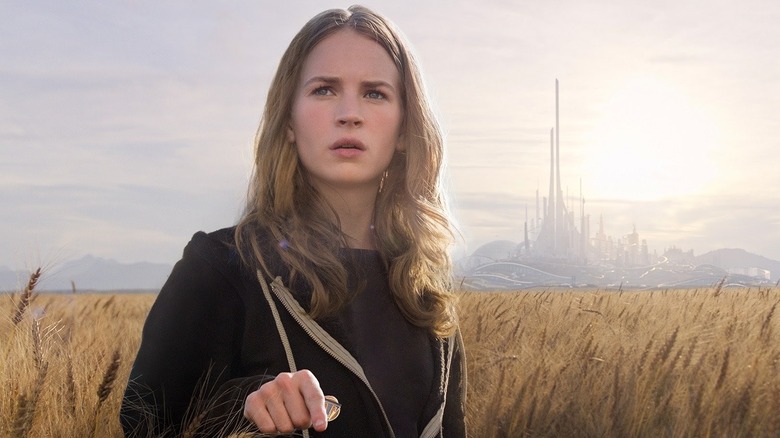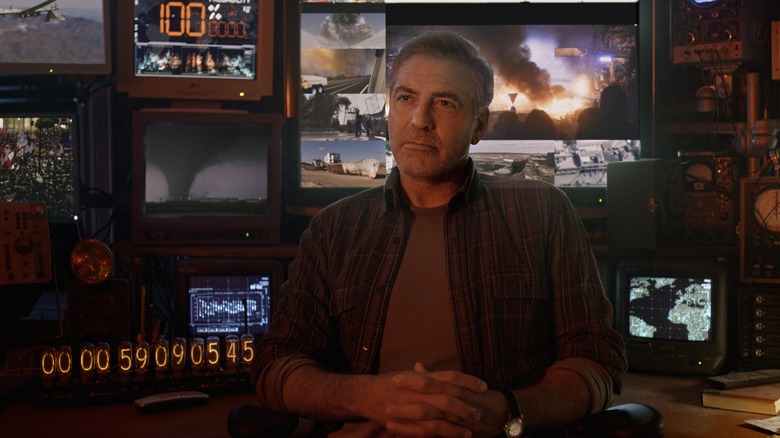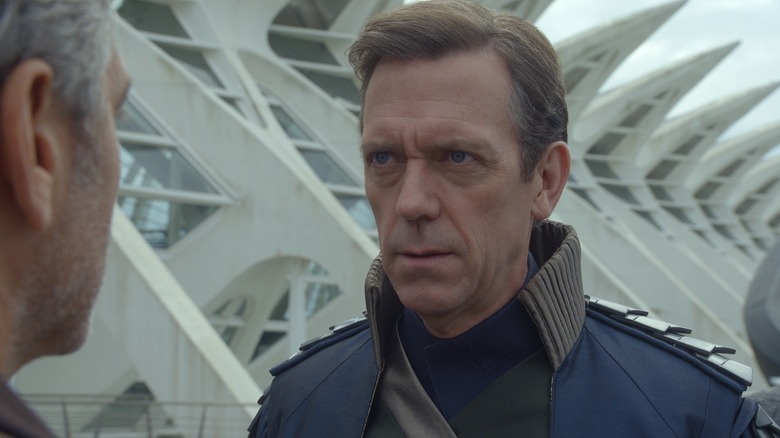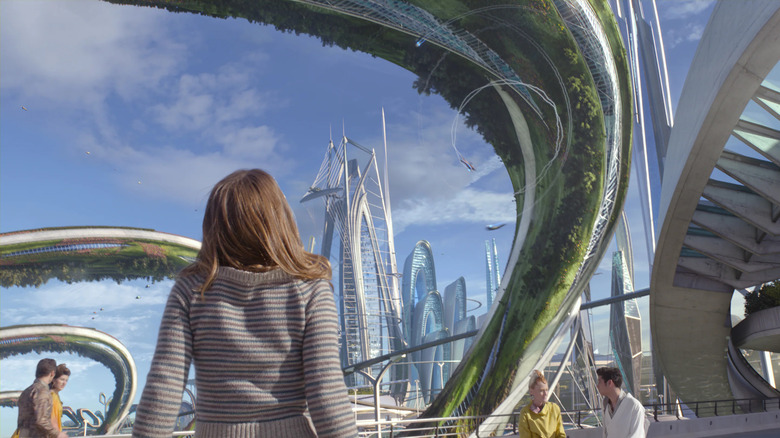Why Disney's Tomorrowland Failed At The Box Office
Disney has had some serious success turning its theme park attractions into movies. Specifically, the "Pirates of the Caribbean" franchise turned into one of the biggest in the studio's history, with more than $4.5 billion worth of box office to show for it across five movies and 20 years. Unfortunately, it has been tough for the Mouse House to replicate that success, as other theme-park-to-silver-screen plays have not been quite as successful. To that end, 2015's ambitious sci-fi flick "Tomorrowland" failed badly to bring the futuristic land from the Disney theme parks satisfyingly to the big screen.
The film, directed by Brad Bird ("Incredibles") flopped brutally upon release, taking in just $209 million worldwide against a massive $190 million production budget. The story, cooked up by Bird and Damon Lindelof ("The Leftovers") did not resonate with moviegoers and, as a result, cost the studio a tremendous amount of money. While the final figures weren't ever revealed, it was somewhere between $120 and $140 million.
So, what exactly went wrong? How is it that talented guys with proven track records such as Bird and Lindelof, working with a cast that included George Clooney and Hugh Laurie, as well as up-and-comer Britt Robertson, dropped the ball so badly? As is so often the case, the answer is both somewhat simple yet layered.
The movie was divisive
Though not a specific ride, "Tomorrowland" was inspired by the area of the same name in Disney's parks that imagines a version of the future. The film itself focuses on a former, disillusioned boy-genius named Frank (Clooney) whose destiny becomes intertwined with a smart, optimistic teen named Casey. (Robertson). They embark on a dangerous mission to unearth the secrets of a strange place somewhere in time and space known only as (you guessed it) Tomorrowland.
While lots of seemingly good pieces were on the board for this one, the film that Bird ultimately put together just didn't gel with audiences or critics. One thing we know for sure is that the film was edited very heavily in post-production, with Judy Greer's role almost cut out completely, for example. Those edits didn't do the film any favors as it currently holds a very poor 50% critical approval rating on Rotten Tomatoes to go with an equally terrible 49% audience rating. Numbers like that lead to poor word of mouth, which kills the week-to-week earnings for a movie like this. Particularly when audiences have other choices available to them, and that may be one of the biggest issues that this movie faced.
It faced a huge amount of direct competition
On its opening weekend in May of 2015, "Tomorrowland" topped the box office with $33 million, but even that was a light haul for a blockbuster of this size. Complicating matters was the fact that the "Poltergeist" remake also hit theaters that weekend, taking in $22.6 million, while "Pitch Perfect 2" and "Mad Max: Fury Road" were also filling lots of seats in their second weekends. Not to mention "Avengers: Age of Ultron" still hanging on with just shy of $22 million in its fourth weekend.
Things didn't get easier in the weeks ahead, as The Rock's "San Andreas," Melissa McCarthy's "Spy," "Insidious Chapter 3," the "Entourage" movie, Disney's own "Inside Out," and, rather crucially, "Jurassic World" all opened to eat up some of the attention of summer moviegoers. Many of those were big crowd pleasers, particularly "Jurassic World," which earned more than $1.6 billion and became one of the highest-grossing movies ever. All of this to say, "Tomorrowland" was in a terrible spot. Even a movie with great reviews against competition like that might have stumbled. But one with a wildly underwhelming response? It had no chance.
Tomorrowland's budget was far too high
In the end, it all comes back to the relativity of success in the movie business. This film carried an absolutely massive $190 million budget, which was far more than many other big hits from that summer. "Mission: Impossible – Rogue Nation" ($150 million), "Ant-Man" ($130 million), and "San Andreas" ($110 million) are just a few examples. But even Disney's own "Pirates of the Caribbean: The Curse of the Black Pearl" was made for $140 million. Yes, blockbusters are expensive but not letting that get out of control is and always has been the key. Disney, from time to time, has to learn this lesson the hard way, with "John Carter" and "The Lone Ranger" serving as other major examples.
Now, would "Tomorrowland" have been a success with a budget closer to $125 million? Absolutely not, as it still would have needed close to $500 million worldwide to see a profit at that level. But Disney certainly would have lost a lot less money had they been able to keep the budget reigned in. It always comes back to the relativity of movie math that determines whether or not something is a hit or a flop. The situation can always (and we mean always) be improved by keeping budgets tight. More often than not, a sky-high budget is the first sign that something is wrong.



